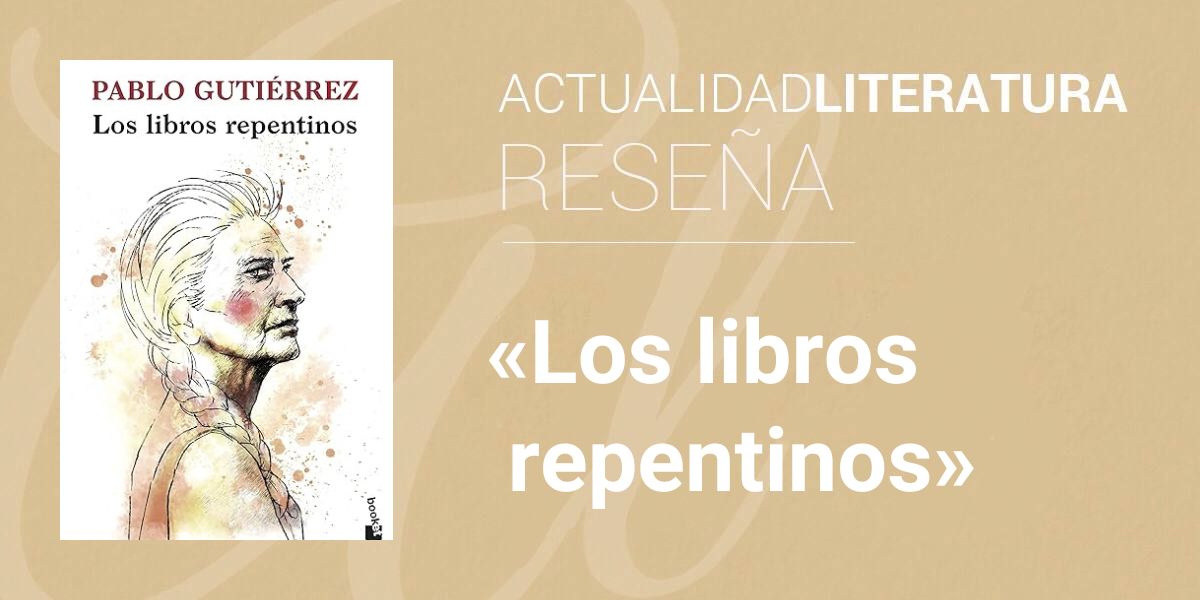
the sudden books
the sudden books is a novel written by award-winning Spanish author Pablo Gutiérrez. The work was published in 2015 by Seix Barral, one of Grupo Planeta's labels. Since its launch, it has become a devastating title, one of those books that move the masses, either because of its prose, its worldview or because of the few who dare to criticize its content.
On one hand, the sudden books It is an ode to the damned contemporary classics of Spanish literature and, on the other, it is a wild attempt to get rid of everything that has been written in recent times, because according to Gutiérrez: “I am suspicious of any strategy, I distrust literary careers, I do not feel any enthusiasm for the appearance of new authors , those new voices from the blablabla scene.”
Synopsis of the sudden books
A box of sudden books arrived by chance to tell him what he didn't know: that half of his life was usurped
This novel by Pablo Gutiérrez revolves around Reme, who, hours after her husband's death, receives a mysterious box of books. Instead of returning them to where they should have gone, she starts reading them without having any kind of knowledge about literature, reading comprehension, or even reading. The protagonist, in mourning, locks herself in her house and devours one title after another.
Without knowing it, understands what many regular fiction readers have discovered over the years: that literature is capable of transforming the life of those who read, which is an ideal door to learn, travel, experience the world and dream of everything that has not been dreamed of before. However, as it is easy to guess, this wonderful gate can only be fully opened if what we have read is put into practice.
Books that talk about survival, contained sexuality and frustrations
If there is something special about literature, it is its ability to make many readers identify with the same story without having experienced it., but to achieve such a feat it is necessary to create characters who can be understood. That is precisely what happens to Reme in her literary refuge. What the latter give him is a passport of no return to what he has not experienced.
That's saying something, since an older woman, especially one of her time, will always have frustrations. These unfulfilled dreams become evident in his longing for the stories he reads. so fervently, because it is through them that he discovers how little he was and how much he can become if he dares to leave behind the comfort of what he knows.
No one comes out of literature unscathed
After having discovered hundreds of universes beyond her own, Reme leaves her house. By leaving her hiding place, the protagonist becomes someone different, everything around her seems different, and there's nothing anyone else can do to put her away again. Captivated by the literature she has just discovered, she begins to see the world through letters, which takes her to the best of places.
This place is herself, and a rebellion that she didn't know she possessed. That idea infects her like a virus that tempts her to change her reality and that of everyone around her. Once out of her shell, she realizes that she can help with a problem that afflicts both her and her neighbors, and understands that social justice can only come if it is reduced to a small environment, like your neighborhood, For example.
Social criticism and satirical humor
Pablo Gutiérrez builds the sudden books through dizzying and disjointed threads, which invites voters to concentrate on what it is trying to tell. The prose, despite its lyricism and originality, is rich in adjectives, and never stops to give space between what happens, what is thought and what is lived. Likewise, the editing is sloppy by avoiding elements such as lines of dialogue or double quotes.
Pathos and tenderness combine in resounding prose, Yes, but this same narrative style is filled with explicit eroticism and a lack of literary signs that, in the end, become confused and disrupt the text until the intention is confused with the author's execution. In this sense, it is worth asking, Are the apparent editing errors part of the way this particular story is told?
About the Author
Pablo Gutiérrez was born in 1978, in Huelva, Andalusia, Spain. He graduated in Journalism from the University of Seville. After graduating, he dedicated himself to communication for some time. Later, he worked as a secondary and high school Literature teacher at the IES Juan Sebastián Elcano in Sanlúcar de Barrameda, in Cádiz.
In his career as a writer he has been influenced by popular culture and television, as well as blog writing. Critics have highlighted his narrative style thanks to the lyricism implicit in it, and they have compared him with authors such as Lara Moreno, Francisco Umbral or Montero Glez. Thanks to his work he has received several awards, among which those mentioned below stand out.
Awards obtained by Pablo Gutiérrez
- XXIX Edebé Prize for Youth Literature, with the work El síndrome de Bergerac;
- Chosen by the British magazine Granta as one of the 22 best writers young people in Spanish;
- Finalist for the II Ribera del Duero Short Fiction Prize, for the book of stories Engrossed Correspondence (2011);
- Critical Eye Award, awarded by Radio Nacional de España (2010);
- Storm Award for best new author (2008);
- Finalist for the Miguel Romero Esteo Theater Award for Pork Meat (2001)
Other books by Pablo Gutiérrez
Narrative
- Roses, remains of wings and other stories (2008, The Factory);
- Nothing is crucial (2010, Rag Tongue);
- Engrossed correspondence (2012, Rag Tongue);
- Democracia (2012, Seix Barral);
- severed heads (2018, Seix Barral);
- El síndrome de Bergerac (2020, Edebé);
- The third class (2023, The Swiss Army Knife).
Theater
- Pork Meat (2001, Junta de Andalucía).
